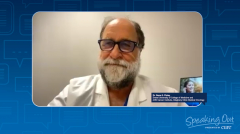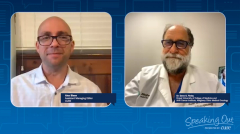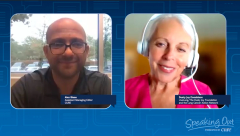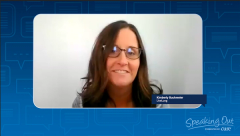
Treatment Advancements Happening in Lung Cancer As Unmet Needs Remain

As part of its Speaking Out® video series, CURE® spoke Dr. Gene G. Finley of Drexel University of College of Medicine and AHN Cancer Institute, Allegheny Clinic Medical Oncology, about advancements in treating non-small cell lung cancer and the unmet needs that persist for patients.
Episodes in this series
Alex Biese: Hi, my name is Alex Biese. I'm the assistant managing editor of CURE® magazine. In this edition of the Speaking Out® video series, I'm speaking with Dr. Gene G. Finley, assistant professor at Drexel University College of Medicine, and a medical oncologist at AHN Cancer Institute Allegheny Clinic Medical Oncology. We're discussing treatment advances for non-small cell lung cancer. Dr. Finley, thank you so much for taking some time to talk to me today.
Dr. Gene G. Finley: My pleasure, Alex.
Biese: So currently, what are the priorities and latest advances in the field of non-small cell lung cancer?
Finley: Well, you know, there's been quite a change since I started in the field a number of years ago. And the main threads include the use of targeted drugs, which can treat specific mutations that occur in 20% or 30% of non-small cell lung cancers. And then, the advent of immunotherapy, which really came to the fore in the 2018 range, (that) is when we really started using it widely, but it's been in clinical trials since about 2015 or so. So there's been a number of, these are really been fundamental advances and have really changed the whole landscape of how we treat lung cancer.
Biese: How so?
Finley: Well, you know, a number of years ago, and if I may take us back in history (to) when I went to medical school — God, that was a long time ago — but when I graduated 1981, we weren't really treating advanced lung cancers very often with chemotherapy, it was relatively ineffective. But by the late '90s, and certainly the early 2000s, chemotherapy was firmly established as a modality to treat lung cancer. And the initial experimentation with targeted drugs, including these special inhibitors of blood vessel formation, formed the mainstay of treatment. That achieved about eight to 10 months survival, and in some studies up to one year, but that was sort of the state of the art in the early 2000s.
And one of the big advances occurred in 2004, with the discovery that certain non-small cell lung cancers contain what are now known as driver mutations. And these are mutations in single genes that tend to drive the development and the growth of the cancer, and the prototype one is a gene called EGFR, epidermal growth factor receptor. And what was discovered is that a pill, at the time a pill called Gefitinib (Iressa) and that pill had remarkable benefits in advanced non-small cell lung cancers in patients who had these special mutations.
So that was around 2004. And that was great. But that really only was helpful for patients who had these special mutations, which can number up to 25% of non-small cell lung cancer patients. And so it really took another decade or so before the insights from the laboratory into the ways of modulating our immune system because, as you know, the immune system forms a very important part of your body's protective mechanisms against cancer in general.
And what was discovered is that these immune cells in your body, T-lymphocytes in the main, those are the cells which can help fight cancer. But unfortunately, your cancers that occur in your body are very adept at turning off the immune system and making it ineffective to fight cancer. And this is one of the major issues that's been plaguing the field for decades. You know, in the earlier decades, we were experimenting with more traditional immune therapy drugs, such as Interleukin and Interferon, and although they worked well in melanoma and in kidney cancer, which are traditional cancers that respond to these immune treatments, those treatments in the '80s and '90s had absolutely no impact on any human solid tumor except the melanoma skin cancer and the kidney cancer.
So, when they started looking at this new class of drugs, which were targeted to the signaling molecules present on that T-lymphocyte, that key cell that helps fight cancer, they were very successful. And this has really revolutionized the treatment of both lung cancer and a number of other solid human tumors that heretofore had no options for immune therapies.
So that's been really the fundamental two advances: the use of targeted therapies in cancer patients with special mutations that lend themselves to that treatment and the use of immunotherapy for a broader swath of patients, where reactivation of the immune system has been of tremendous benefit.
Biese: And now looking forward, what are some unmet needs that still remain, regarding treatment and advances that are hoped for, for the future?
Finley: A couple of things. I think that there's a number of threads going on. Now, one thing to bear in mind is although we have some very effective reagents, they are only interacting with two pathways which occur on the T cell, and there are literally more than two dozen pathways that regulate T cell function. So, one of the areas of drug development is looking at different molecules that can help or inhibit the function of those T cells, both for treatment of cancer and perhaps other autoimmune diseases. So that's one broad swath of how things are moving forward.
I think the other major area of interest is in cellular immunotherapy. So, there's been a lot of work done demonstrating that if you can engineer a T cell to fight cancer by genetically modifying your own T cells, that's a very good strategy and it's been highly effective in leukemias and lymphomas, the so-called "liquid tumors." It hasn't really made the jump to solid tumors such as lung cancer, but this is a work in process, and we are, in fact, conducting a clinical trial in lung cancer using lymphocytes, not derivatized lymphocytes but lymphocytes derived from tumor cells. And that strategy seems to be a good avenue.
And so, I would say those are the two things: better drugs to modulate T cell function and engineering T cells to fight cancer directly. And obviously, there are a lot of other threads out there are that are important as well.
Biese: There has been a fair bit of conversation in the oncology space regarding the chemotherapy drug shortage that's ongoing. What sort of impact has that had on patients with non-small cell lung cancer?
Finley: Well, in the main, we've been pretty successful at AHN in anticipating these drug shortages. So one of the key shortages is of a drug called cisplatin, that's been a common one, and (for) that particular drug, there are other medicines that work similarly, for example, a drug called carboplatin. So we tend to use more carboplatin than cisplatin because cisplatin is harder to tolerate. It causes more nausea and vomiting than carboplatin and it causes more kidney damage than carboplatin. In many of our lung cancer patients, they're all already elderly, they're already infirm, so we like to use drugs that are more tolerable so that we can actually get the treatments into the patient.
So for most lung cancer patients — remember now that two-thirds of lung cancer patients present in an advanced stage where traditionally (they) have not (been) felt to be curable, so in that setting, that's where we use the bulk of these platinum-based chemotherapies.
In patients who have had an early stage, say a stage 1 or stage 2 lung cancer, there the mainstay of therapy is surgery. And that's where we often would use cisplatin chemotherapy, as a prevention or as an adjunct to the surgery after the surgical treatment. And that strategy has also been pretty effective. And that's where the drug shortage of cisplatin has been most difficult for us, and not in the vast majority of patients who present with advanced disease, if that makes sense.
Biese: It does. Is there anything else you would like the CURE® audience to know about this topic of treatment advancements for non-small cell lung cancer?
Finley: Well, no, I think that we've pretty much covered the gamut in a short period of time. There's obviously a lot more. But I think that those are the main ways going forward. I would say in addition, that we're constantly identifying new avenues, new genes that are deranged in cancer. And we've been looking at other targeted drugs that to help fight those. So I think we're going to see sort of a filling out of our quiver, so that we have more arrows to hit more targets in the cancer as time goes on. That's another area, a lot of drug developments going on in that space as well.
Biese: Got it. Well. Dr. Finlay, thank you so much for your time today. I and our audience really appreciate it. Hope you have a great day, sir.
Finley: My pleasure.
Transcription edited for clarity and conciseness.








